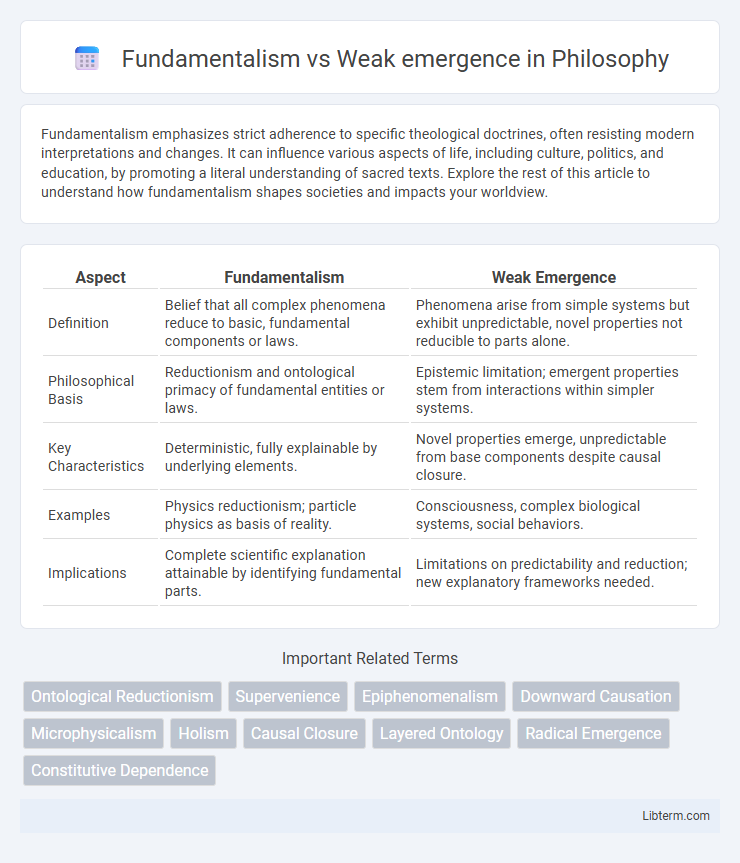Fundamentalism emphasizes strict adherence to specific theological doctrines, often resisting modern interpretations and changes. It can influence various aspects of life, including culture, politics, and education, by promoting a literal understanding of sacred texts. Explore the rest of this article to understand how fundamentalism shapes societies and impacts your worldview.
Table of Comparison
| Aspect | Fundamentalism | Weak Emergence |
|---|---|---|
| Definition | Belief that all complex phenomena reduce to basic, fundamental components or laws. | Phenomena arise from simple systems but exhibit unpredictable, novel properties not reducible to parts alone. |
| Philosophical Basis | Reductionism and ontological primacy of fundamental entities or laws. | Epistemic limitation; emergent properties stem from interactions within simpler systems. |
| Key Characteristics | Deterministic, fully explainable by underlying elements. | Novel properties emerge, unpredictable from base components despite causal closure. |
| Examples | Physics reductionism; particle physics as basis of reality. | Consciousness, complex biological systems, social behaviors. |
| Implications | Complete scientific explanation attainable by identifying fundamental parts. | Limitations on predictability and reduction; new explanatory frameworks needed. |
Introduction to Fundamentalism and Weak Emergence
Fundamentalism asserts that all complex phenomena can be fully explained by fundamental physical laws without any new principles at higher levels. Weak emergence describes how complex systems exhibit novel properties arising from interactions of simpler elements, which are predictable only through detailed simulation or analysis. This distinction highlights the debate between reductionist approaches and the recognition of emergent behaviors in science and philosophy.
Defining Fundamentalism in Philosophy and Science
Fundamentalism in philosophy and science asserts that all phenomena can be explained by underlying basic laws or elements, emphasizing a bottom-up approach where complex systems are reducible to their fundamental parts. This worldview contrasts with weak emergence, which acknowledges that higher-level properties arise from but are not easily predictable or reducible to lower-level components. Defining fundamentalism involves recognizing its commitment to reductionism and the belief that ultimate explanations rest in fundamental constituents, such as particles in physics or logical primitives in metaphysics.
Understanding Weak Emergence: Key Concepts
Weak emergence refers to complex system behaviors arising from simple interactions at lower levels without requiring new fundamental laws. Key concepts include computational irreducibility, where higher-level patterns cannot be predicted solely from underlying rules, and macroscopic properties that emerge from microscopic dynamics. This contrasts with fundamentalism, which posits that all phenomena can be fully explained by fundamental entities or laws without emergent properties.
Historical Context and Evolution of Both Ideas
Fundamentalism emerged in the early 20th century as a reaction against modernist interpretations of religion, emphasizing a literal and unchanging adherence to core doctrines. Weak emergence, a concept developed in the late 20th century within philosophy of science and complex systems theory, describes phenomena that arise from underlying simple interactions but cannot be predicted solely from knowledge of those interactions. The historical evolution of fundamentalism reflects socio-political responses to cultural change, whereas weak emergence evolved through advances in computational models and interdisciplinary research in physics, biology, and cognitive science.
Core Differences: Ontology and Explanation
Fundamentalism posits that reality consists of basic, irreducible entities and laws that fully explain phenomena, emphasizing ontological primacy and reductionist explanation. Weak emergence acknowledges higher-level properties arising from complex interactions without new fundamental laws, focusing on explanatory novelty without ontological independence. Core differences highlight fundamentalism's reliance on ontological fundamentality versus weak emergence's acceptance of explanatory layers and systemic complexity.
Philosophical Arguments Supporting Fundamentalism
Philosophical arguments supporting fundamentalism emphasize that all phenomena, including mental states and consciousness, can be fully explained by basic physical laws and particles, rejecting the idea that higher-level properties have independent causal powers. This view relies on the principle of ontological reductionism, asserting that complex systems are nothing over and above their fundamental constituents, thereby denying ontological novelty. Fundamentalism is bolstered by the success of physical sciences in providing unified explanations, which challenges the weak emergence claim that new causal powers arise at higher organizational levels without reducibility.
The Case for Weak Emergence in Complex Systems
Weak emergence in complex systems describes how higher-level patterns arise from the interactions of simpler components without being reducible to fundamental laws. This concept highlights that macroscopic properties can be unpredictable and irreducible, despite full knowledge of microscopic rules, contrasting with fundamentalism's focus on basic underlying principles. The case for weak emergence emphasizes phenomena like flocking behavior, where collective dynamics emerge from simple local interactions, demonstrating genuine novelty at the system level.
Real-World Applications: Physics, Biology, and Beyond
Fundamentalism in physics seeks to explain phenomena through basic, well-defined laws, whereas weak emergence recognizes higher-level patterns arising from complex systems without reducing them to fundamental components. In biology, weak emergence aids in understanding cellular behavior and ecosystem dynamics through interactions at different scales, while fundamentalism attempts to decode life processes from molecular laws. Beyond these fields, weak emergence informs artificial intelligence and social sciences by modeling how collective behaviors emerge from simpler units, contrasting with fundamentalism's pursuit of universal foundational principles.
Criticisms and Limitations of Each Perspective
Fundamentalism faces criticism for its reductionist approach, often oversimplifying complex phenomena by attributing them solely to basic components, thereby neglecting emergent properties that arise from interactions. Weak emergence is limited by its reliance on computational models or simulations, which may fail to capture the full unpredictability and novelty of emergent phenomena in natural systems. Both perspectives struggle with explanatory scope: fundamentalism risks ignoring systemic behaviors, while weak emergence can lack precise predictive power and clear ontological status.
Toward Reconciliation: Is a Middle Ground Possible?
Exploring fundamentalism versus weak emergence reveals potential for reconciliation through a nuanced understanding that accepts fundamental laws while recognizing emergent properties as real and significant. The middle ground emphasizes that emergent phenomena, though dependent on fundamental components, exhibit novel behaviors irreducible to basic physical laws alone. This approach fosters integration of reductionist principles with holistic perspectives, promoting a comprehensive framework in philosophy of science and complex systems theory.
Fundamentalism Infographic

 libterm.com
libterm.com